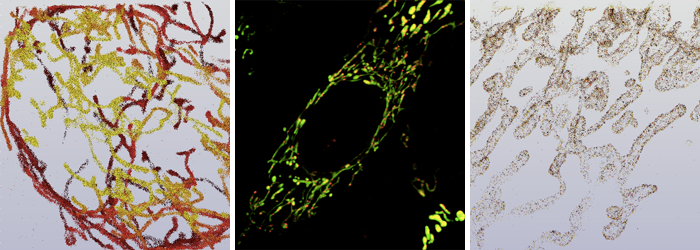Our research group focuses on the role of mitochondria in physiological and pathophysiological processes of the cell and organism. Mitochondria are the main source of cellular energy, ATP, which is essential for maintaining vital cell functions. Additionally, mitochondrial metabolism also leads to the production of oxygen radicals, reactive molecules that have a negative impact on the cell functioning, i.e. irreversible damage of cellular proteins, lipids and DNA (both mitochondrial and nuclear). Such prolonged oxidative stress in extreme cases leads to cell death. Chronic, albeit relatively moderate oxidative stress accompanies number of pathophysiological disorders including neurodegenerative diseases (such as Parkinson's and Alzheimer's disease), but for example also type 2 diabetes and pulmonary hypertension, the etiology of which we study in our laboratory. In case of irreversible damage mitochondria must be removed by specific pathway of autophagy, called mitophagy. This process is crucial for mitochondrial quality control process, disruption of which is accompanied by a number of diseases such as type 2 diabetes, which is where we study the mitophagy. Moreover, mitochondria are semiautonomous organelles for they have mitochondrial DNA (mtDNA). Genetic manipulation of the mtDNA is rather complicated and yet there has not been found satisfactory method which would allow us for e.g. gene silencing or in-situ quantification of genetic mutations in mtDNA. The development of such techniques is one of out goals. Since mitochondria are rather small organelles and resolution of commonly available light and fluorescence microscopy is not sufficient to study certain aspects of their morphology, we employ special super-resolution fluorescence microscopy. The prototype of such microscope we have recently purchased for our department. We develop further methodologies of “nanoscopy” to study mitochondrial morphology and function. Finally, we study the role of mitochondrial signaling in cancer cells and cancer-specific enzymatic pathways, study of which could be essential for the development of future anticancer drugs.
Concerning applied research, we also develop novel drug carriers to transport specific anticancer drugs called photosensitizers into cancer tissues. Our findings have been patented in Industrial Property Office of the Czech Republic.






